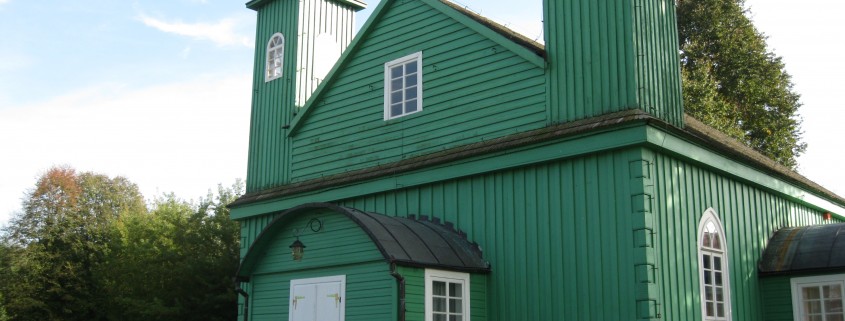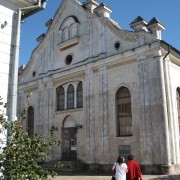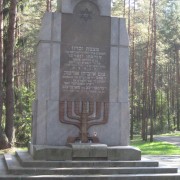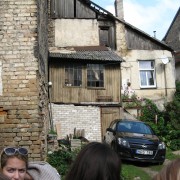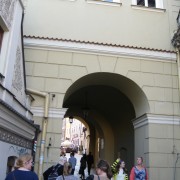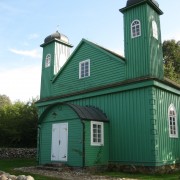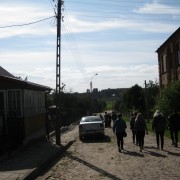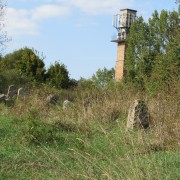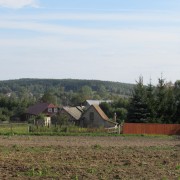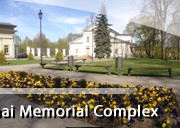Experiences Within the Former Grand Duchy of Poland-Lithuania
By: Kevin Kuzniczci
From the time I had appeared at the international airport in Vilnius, Lithuania to the first minute our group presented ourselves at our hostel in Warsaw, we gained significant insight to the lessons of reconciliation and memory within one of the darkest times in human history in one of Europe’s largest former monarchy within the continent; to understand this remember that the Poles gained influence throughout east-central Europe, and when pagan Lithuania wanted protection from the threat of the Teutonic knights, the marriage of Poland and Lithuania in the 14th century made this kingdom a stronghold for the urban Poles and the more rural Lithuanians. Within our group’s travels in Vilnius, we discovered that there was much, much more to the “Jerusalem of the North” than any of us had anticipated; the amount of attention Paneriai forest, just a few kilometers out of Lithuania’s capital, receives amongst the Lithuanian people taught us about the necessity involved with public memory in humanity’s tests of endurance. In Sejny, in northeastern Poland, the group and I met up with the folks behind the Borderland Foundation to learn about the valuable lessons involved with coexistence; visits to the local Jazz lounge, the artistic workshop, and other eye-opening experiences within Sejny all helped us comprehend the rewards of coexistence. The depressing history of Krynki taught to me the dangers of ignoring the lessons and history of one’s own homeland, as the state of deterioration within the town’s borders is quite evident; learning about the Tartars in Kruszyniany’s mosque brought up questions concerning relations between the Catholic majority and the Tartar minority. Finally, my days at Lublin entailed learning about the significance of the Grodzka Gate in Lublin’s history concerning the Jewish populace, as well as the contributions associated with the Jewish Heritage Trail, in relation to how people negotiate with their identities.
Throughout Vilnius, there were quite a number of aspects that caught my eye in relation to the concept of negotiating identities (especially considering that this region of Europe, alongside most of Poland, was well known for its Jewish population that migrated here during the Poland-Lithuanian times). The synagogue that we visited on September 11th, 2014, the one that has defied the power of the Soviet Union by refusing to give into temptations of power and abandoning their beliefs for a more comfy position in Soviet life, amazed me in that some aspect from the fringes of society managed to hold itself together (despite the odds being against the synagogue’s survival being colossal). The Jewish hospitals that ran their course under Nazi occupation also captured my attention in the fact that, in opposition to the Nazi’s ban on hospitalization of Lithuanian Jews, they continued to operate despite the enormous likelihood of being sentenced to death.
As someone who lived in the southwestern United States for most of my life the; as an example the “myths” the children created animations about invoked that particular sense of understanding “the other” at an concepts introduced by Czyzewski proved to be very informative, as the various forms of media utilized by the foundation, I have noticed, tend to create a sense of comfort around foreign cultures early age, thus increasing the likelihood of maintaining a tolerant attitude. The stories told by Wieslaw (in the Jazz lounge neighboring the former synagogue) emphasized the importance of knowledge when compromising with “foreign” peoples, especially when ultra-nationalism tends to override morality and reason; one cannot reconcile with another unless they discuss with others in an honest manner, so the importance of storytelling and communication is the key to mending divisions in our world. Finally, in our own agora, we learned from Czyzewski about the power of optimism when constructing projects such as the Borderland Foundation, as I have noticed that optimism tends to be the more peaceful way of considering important decisions. People who do not agree with me would probably comprehend these ideas more if the sights of Krynki and Kruszyniany are elaborated upon.
The town of Krynki is a fairly obscure town just a few kilometers west of the Belarusian border that not even most Poles know about, even though 70% of the populace before World War II was Jewish.
Exploring the former tannery in the town, the synagogue of the Hassidic Jews, and the appalling state of the local Jewish cemetery made me realize what specifically happens when open, honest discussion between different peoples does not occur and how a lack of information about one town’s past blinds folks’ perception of their history. When people pledge allegiance to nationalist ideals and refuse to admit any wrongdoing in the past, such as the mistreatment of the Jews by Poles as explained by our Belarusian lecturer, not only are divisions continually fortified, but people forget about the lessons to prevent these horrific actions from occurring again.
Once we arrived at Kruszyniany’s Tartar mosque we were taught about the role of the Tartars throughout Polish history (especially how fierce they fought for the Polish military during the Polish-Lithuanian era and were rewarded for sticking with the Poles despite the temptation of power offered by the Ottomans) and how their contributions to society are appreciated today; even though there was an offensive act of vandalism two years ago the proactive stance the local police had taken really surprised me and I realized that discourse concerning the Tartars was the solitary reason why they are still respected to this very day. The stark contrast between Sejny and Krynki, as well as the importance of schooling when conversing between different peoples, reminded me of the first class of ‘Discord and Unity’ when the professor explained the importance of Socrates’ convictions of egalitarianism; it is a shame that the divided town of Lublin was not in a position to preserve its large Jewish heritage as much as Sejny.
During my time in Lublin we visited the Grodzka Gate, which initially divided the town between a Christian section and a Jewish section (which was, unfortunately, a common sight during the Poland-Lithuania era due to Christian prejudice directed at Jews); within the gate was a mysterious student (at a local university in Lublin) labeled “No Name” (NN) that decided to utilize the medium of theater to convey herself in Cold-War Poland, where such forms of expression were forbidden due to the totalitarian restrictions to limit dissent to a massive degree. We also were explained that the association within the gate contains public works projects intended to educate the public about Lublin’s Jewish past, which I thought was a fairly appreciable idea because of how homogenous societies have the tendency to be closed-minded to certain groups or ethnicities that deviate from the norm. The tours that the group and I traversed through on the Jewish Heritage Trail really give a sense of the somewhat serious atmosphere of Lublin during the past century, as being in the physical presence of the actual city provides a feeling of what life was like. In addition, learning about the “Righteous Among the Nations” award, for those who assisted the Jews in Poland despite the peril of execution, really deepened my understanding about how cruel and soul-crushing the Nazi regime was; it truly takes so much mental energy to be able to preserve such history (especially when only 10% of the total Jewish population survived by the end of the war).
To reflect upon my experiences, I shall sum up the basic themes of each destination. In Vilnius, I learned about the locations of Jewish heritage that demonstrated mental fortitude and a relentless sense of preservation of such heritage. In Sejny, the Borderland Foundation taught me how to not only invoke historical memory to other people, but also methods of discussing and maintaining peace in a diverse environment. Krynki and Kruszyniany both demonstrated what happens when the concepts of the Borderland Foundation are not utilized, when nationalism takes precedence over the truth, and how discourse is vital to respecting one another. In Lublin the education processes within the Grodzka Gate, while not purely focusing on integration, attempt to teach Lubliners about the city’s Jewish past based on knowledge and insistence, without attempting to appeal to nationalistic emotions too much (in which these feelings of apathy amongst Lubliners is reminiscent of the segregation between Christians and Jews back in the medieval times with the idea of “out of sight, out of mind”). Overall, the lands of the former Poland-Lithuania, while once very diverse and unusually populous, in this present day invoke a sense of loss, as if some great and influential presence had once roamed these lands; through negotiating identities and reconciliation between the parties involved, perhaps such former glory can be revived again.

